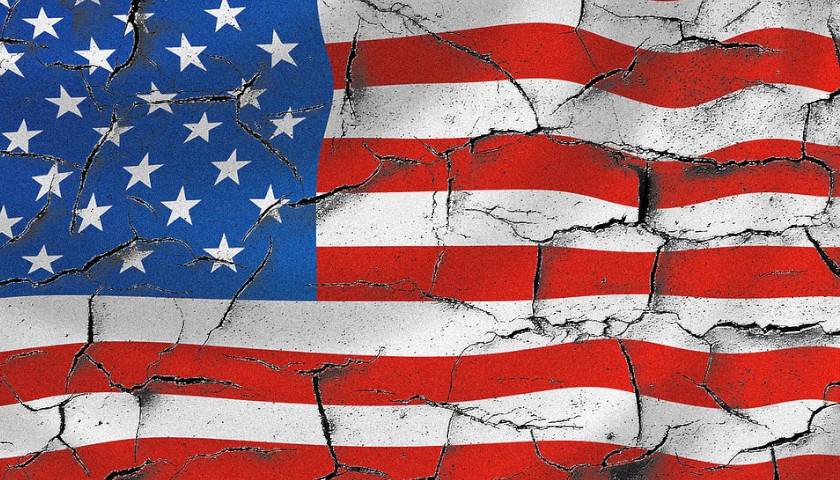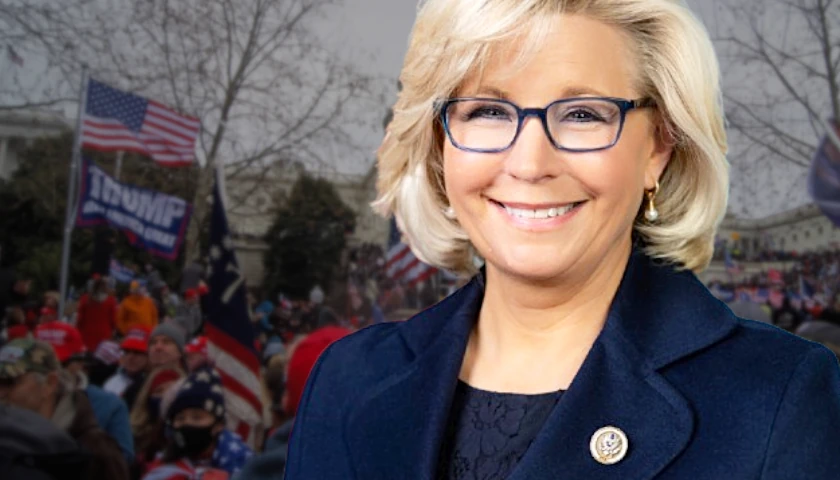by Helen Lamm
Whether we like it or not, the defining political disagreements of our time are no longer based on differences of constitutional interpretation.
“Limited government” is probably the most broadly accepted unifying principle of the conservative movement. You can find the phrase in the mission statements of the country’s most prominent right-leaning think tanks. It is a hallmark of modern conservative thought, an homage to the glory days of Ronald Reagan and Margaret Thatcher. The conservative movement built its political identity on this principle, and for good reason. Bureaucratic tyranny, like Cthulhu, expands indiscriminately while crushing civil society under its ever-increasing weight.
Bureaucratic overreach is a problem, but it is not the problem. Conservatives tend to distract and paralyze themselves by so rigidly focusing on the principle of “limited government.” Fearful of overreaching, they stand still as the Left reaches over them. Despite operating in what effectively is a post-constitutional context, they attempt to play by rules their enemies have long since abandoned.
Take, for instance, Representative Thomas Massie of Kentucky, one of 13 Republicans who voted with the Democrats to overturn President Trump’s national emergency declaration to build the wall. He tweeted late last month, “If we violate the Constitution to build a wall, then the wall protects nothing.” Meanwhile, 1.5 million illegal aliens will enter the American population this year. We can tell they are “natural conservatives” though, by the way they respected the Constitution upon unlawful entry.
The idea that Trump’s so-called executive overreach is a greater threat to America than invasion on the southern border exposes a flaw in the “conservative” movement which will lead to its irrelevance. This might be the main reason that they have conserved nothing, especially not the constitutionalism they love: Conservatives fail to perceive what is essential.
The Essence of What Needs Conserving
What is essential to America is that which indispensably makes America what it is. This is the distinguishing factor—the unifying force. American identity, far from some lofty abstraction, is a social reality that actually lives in the American people.
Identity, unity, and the essential. These terms are closely related. Identity is the “sameness in all that constitutes the objective reality of a thing,” or “essential oneness.” Unity is the quality or state of being one. Common identity unifies by referring to the essential sameness of one thing and another.
The current usage of identity belies its true meaning. “Identity” in the postmodern parlance references that which makes the individual utterly unique unto himself, objective reality be damned, i.e., “I identify as a transracial, pansexual feline-spirit entity.” Colloquially, “identity” is exceedingly self-referential and infinitely malleable. The term “identity politics” refers not to the politics of unity, but to the politics of ego, diversity, disunity, and atomization. This kind of usage is improper. In this essay, identity and unity may be used interchangeably. By their true definition they are indistinguishable. Identity is the essence of unity and vice versa.
Today, the central threat to the continued existence, let alone health, of the nation is the decimation of meaning in citizenship that has followed the persistent denial of an essential American identity by both the modern Left and Right. Both peddle an ahistorical lie which abetts the trajectory of disunity and destruction: that no common history, culture, or language is required to be an American. Both have conflated these standards with racial discrimination, where no such connection is self-evident. These days, one cannot venture to define what it means to be an American—beyond the vague willingness to contribute to the economy—without enduring unfounded charges of “bigotry.”
Identity best can be understood as the unspoken knowledge of self which is sensed commonly. Its implicit character makes it a bit slippery, but that does not reduce its potency.
The American identity emerged from a shared history. This history is tied up in the habits and principles of ordered liberty, privacy, equality before the law, agrarian grit, self-reliance, Christian charity, British common law, devotion to family, and self-governance through civil society. But is rooted most strongly in the fact of common heritage. Consanguinity is one of the central pillars of any regime, including ours. America, more than any other nation, has a foundation capable of unifying diversity of origin, religion, and blood. But to act as if such considerations are irrelevant or, worse, that they do not exist at all, is delusional.
In presidential letters and addresses throughout American history, allusions to this noble and transcendent American character abound. While none of these tendencies are explicitly stated in the American founding documents, American statesmen across time perceived a cohesive American unity and identity. These great men feared that the loss of that essential American character would cause the government itself to fall apart.
In Federalist 2, John Jay identified the existence of this central American unity:
It has often given me pleasure to observe that independent America was not composed of detached and distant territories, but that one connected, fertile, widespreading country was the portion of our western sons of liberty… With equal pleasure I have as often taken notice that Providence has been pleased to give this one connected country to one united people—a people descended from the same ancestors, speaking the same language, professing the same religion, attached to the same principles of government, very similar in their manners and customs, and who, by their joint counsels, arms, and efforts, fighting side by side throughout a long and bloody war, have nobly established general liberty and independence. This country and this people seem to have been made for each other, and it appears as if it was the design of Providence, that an inheritance so proper and convenient for a band of brethren, united to each other by the strongest ties, should never be split into a number of unsocial, jealous, and alien sovereignties.
In his farewell address, Washington echoed Jay’s recognition of “the unity of government which constitutes you one people:”
The name of American . . . must always exalt the just pride of patriotism more than any appellation derived from local discriminations. With slight shades of difference, you have the same religion, manners, habits, and political principles. You have in a common cause fought and triumphed together; the independence and liberty you possess are the work of joint counsels, and joint efforts of common dangers, sufferings, and successes.
As a matter of belief, behavior, and common history, Jay and Washington both saw Americans’ “union and brotherly affection” and hoped that it would endure. It was not perfect homogeneity, of course. A multitude of behaviors and beliefs contribute to the je ne sais quoi of what it once meant to be an American.
Tocqueville pointed to this limited plurality as well. Despite minor differences, the majority of American people remained throughout the early and middle days of the republic unified around a basic Christian moral structure, patriotism, and, above all, shared history.
This common identity of the American people by its very existence demanded political union in the first place. In his first inaugural address, President Abraham Lincoln invoked the historical perpetuity of this unity to justify his insistence on its continuation:
…the Union is perpetual confirmed by the history of the Union itself. The Union is much older than the Constitution. It was formed, in fact, by the Articles of Association in 1774. It was matured and continued by the Declaration of Independence in 1776. It was further matured, and the faith of all the then thirteen States expressly plighted and engaged that it should be perpetual, by the Articles of Confederation in 1778. And finally, in 1787, one of the declared objects for ordaining and establishing the Constitution was to form a more perfect Union.
To Lincoln, the Constitution reflected a political union that transcended any single document. The Constitution was thus an enunciation of American identity, designed and upheld by and for an American polity unified by the “mystic chords of memory.” The American people and their common identity and interests predated and justified the founding documents, not the other way around.
The core unity of a people is the raison d’être of nationhood. Jay, Washington, Lincoln, Tocqueville, Adams, Madison, and especially Teddy Roosevelt recognized this and knew that one could not exist without the other.
The Cancer Destroying Our Unity
In the mid-20th century, the spiritual and psychological sickness made manifest in the heart of international Communism crept into parts of the West. Like a cancer, subversive ideologies metastasized in our culture leading to a crisis of identity that corrodes our national character today.
American people by their mythos (“He who shall not work shall not eat”) would naturally hate the premise of global Communism. So cosmopolitan European ideologues—detesting the prudence of the American tradition—clandestinely infiltrated America’s academies. To upend the nation, they targeted the center of gravity: the social mores, civic institutions, and shared history which sustained and connected the American people to one another.
Employing tactics designed by the likes of Antonio Gramsci, the Frankfurt School, and Saul Alinsky, American institutions that deal in the business of conceptual reality, symbol, belief, and meaning (Hollywood, academia, public office, and even the church) have for more than 50 years propagated anti-American sentiment through mainstream channels of communication. The propaganda’s tenets reflect the exact target of the subversion: America’s Founders.
As axioms of national myth, the Founders were the operational center of gravity for those interested in engaging in political warfare against the American people. In the very institutions which in a healthy society would serve to cultivate the natural love of country and of fellow countrymen, a rabid hatred of country, specifically of the founders and those who share the Founders’ identity, proliferated.
These days, the new barbarians target high schools named for Jefferson, Madison, and Franklin for renaming. Revisionist history suggests to American youth in public school systems that slavery and sexism were the real, primary founding principles, and that universal terms such as liberty and equality were mere words serving the convenience of those evil white men in their rise to power. To atone for such a past, Americans must now publicly self-flagellate and accept the dogma of diversity.
Presented as a self-evident good, diversity actively maximizes differences between fellow countrymen, elevates practices and beliefs which fall outside the American tradition to a pedestal above, and demonizes American heritage. The “antiquated,” “anglocentric,” and “oppressive” mores of America’s past are, for the advocates of diversity, a vestige of a society which deserves no respect, let alone veneration or continuation. America can only be redeemed of its original sin by abandoning its heritage entirely.
Magnifying the Effects of Cancerous Ideology
Unfettered immigration magnifies the demoralizing effects of the denigration of American identity. Deracinated America has no explicit qualitative or quantitative standards for citizenship; the dogma of diversity does not allow it. Complete nondiscrimination is the only standard, for there is no American identity attached to objective reality, we are told. We are simply a nation of immigrants, with no discernable unifying features save for a vague willingness to contribute to the economy. Our “creed” boils down to dollar worship, an ambiguous belief in radical individualism, and an unconfirmable disposition to uphold the existing political order.
While Americans whose families have been part of the nation for as far back as anyone can remember are compelled to hate themselves and their history, new “Americans” are celebrated for their foreign identities and cultures. The classic American identity is widely understood either to be non-existent (“no such thing as American culture”) or fundamentally evil (“America was never great!”). What person with foreign roots would adopt such a weak, self-effacing nonidentity? Naturally, blamelessly, immigrants cling to their original identities, and find unity amongst themselves rather than in the broader community.
As citizens grow apart, America becomes less a nation than a global free-trade zone. The ties that bind us as citizens may be legal or financial, but they are hardly familial and less friendly than ever. The traditional cultural reference points which once united Americans either are maligned or discarded. In the melting pot of hyphenated nationalities, heritage Americans, incapable of tapping into their historical identity, are increasingly driven inward. Civil society languishes. Immigrants assimilate to nothing, for there is no public unity into which they can be invited or assimilated. The body politic is dismembered.
The Sad Tribal Result
Balkanization reduces politics to a power competition between demographic factions. If we want to avoid looking like 1990s Yugoslavia in the near future, if we are to have a nation at all, American identity must be rediscovered, revived, and fearlessly asserted.
Having lost ourselves over the course of the last century, how are we to know what American identity is? How can we reverse this entropy?
We can stanch the bleeding and refer to our national mythos. Confronting the problem of American unity will require a radical readjustment of the country’s immigration system and an equally radical cultural reckoning: a full moratorium on both immigration and self-deprecation.
Patriots must unabashedly assert that American identity is real, that it is good, and that we, the people, collectively get to decide who may partake in our American dream according to our cultural preferences. We can honor American artists and heroes, local and national, and prioritize them over more postmodern, deconstructionist options. We can assert, loudly, that our American Founders were good men, and that what they built was entrusted to a good people.
If we have no unity, commonality, or characteristics that can be considered general, there can be no perfect union, no common defense, and no general welfare. Americans owe it to ourselves and our posterity that we restore our history, culture, language, and traditions. We must preserve our good heritage, no matter what, lest the essential unity that made America, and that made America great, crumble completely into oblivion.
– – –
Helen Lamm is a Mount Vernon fellow of the Center for American Greatness.





